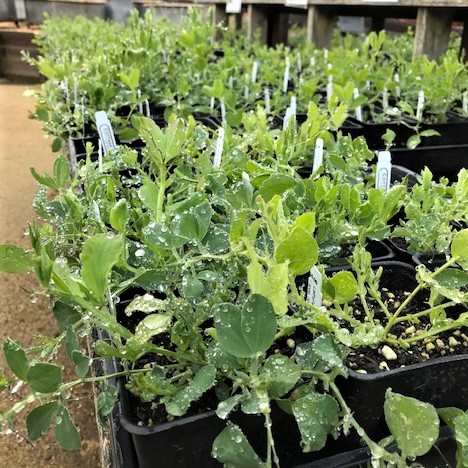If it’s fall and you live in USDA Hardiness Zones 8 and above, you should be planting your sweet pea seeds. Sweet peas are climbing annual plants that bear clusters of extraordinarily fragrant, almost butterfly-like blooms in spring and early summer. The gorgeous, fluttery flowers come in a wide range of vibrant colors, including white, red, pink, purple, and lavender and can even be found stiped or bicolored. They’re gorgeous adorning fences, obelisks, or trellises and are simply stunning in bouquets. But to get the biggest flower display, you don’t plant the seeds in spring like many annuals—you sow them in fall.

Plant sweet pea seeds in autumn
In places like Northern California (Zone 8 and above), sweet peas vines bloom most abundantly and with longer stems and bigger, better blooms if they’re planted in fall, with late September through early November as the planting times that give the best results. This is because cooler fall and winter temperatures allow the plants to establish strong, healthy root systems before lengthening spring days and rising temperatures encourage buds to form and the flower show to begin. A second planting window presents itself from February through March, but the vines tend to be less vigorous and the blooms slightly less profuse. Seeds planted any later (in early spring) usually result in almost stunted-appearing plants and disappointingly short-stemmed flowers.

Soak your sweet pea seeds for the best germination
Always start with clean, fresh sweet pea seeds; if the seeds look shrunken and discolored, chances are they won’t sprout. The day before planting, soak the seeds overnight in a bowl of room-temperature water. To hasten germination, any seed not swollen after soaking should be chipped or nicked with a sharp razor blade in order to break through its tough skin. Plant the seeds 1 inch deep and 2 to 3 inches apart.
Sweet peas flourish when planted in a sunny location with well-anchored, vertical support that’s tall enough to allow them to climb to their full 6- to 7-foot height. For best results, make sure the soil drains easily and has been enriched with organic compost.

To get an even bigger jump on the season, start them indoors
You can start your sweet pea seedlings indoors in an unheated greenhouse or in a cold frame 4 to 5 weeks before you plan to set them out in the garden. Protection from birds is vital (bird netting works wonderfully), but this hardy annual is frost tolerant, so at least that is one less thing to worry about. When the seedling has reached 3 to 4 inches tall, pinch the tip to encourage branching, which will result in even more spring blooms. If you don’t manage to plant ahead, your local garden center should be a source for healthy sweet pea starts.
How to keep sweet pea plants pest-free
It’s critical to protect your sweet pea seedlings from birds, aphids, snails, and slugs. Bird netting works for the bird situation, and Sluggo or a homemade beer trap helps keep slugs and snails at bay. Aphids can transmit disease to your plants, but foliar feeding with weak manure tea will make the foliage distasteful to these pesky insects and ensure healthy, deep green leaves as well.

To keep sweet peas blooming, cut them often
The more flower wands you cut, the more your sweet pea plants will bloom, so pick as many flowers as possible as frequently as possible. If you miss a few days or overlook a spent bloom or two, be sure to remove any seedpods to ensure that the plant focuses on flowering instead of diverting all its energy into seed production.
After sweet peas have been blooming for a while, the length of the flower stems will naturally shorten. To regain longer stem length, side-dress the plants with a small amount of blood meal. Sprinkle the soil amendment alongside the plant, scratch it in by hand, being careful not to damage the roots, and water in thoroughly. This should ensure that the show keeps going for a few additional weeks.
For more on sweet peas, click here.
—Fionuala Campion is the owner and manager of Cottage Gardens of Petaluma in Petaluma, California.
Photos: Fionuala Campion
